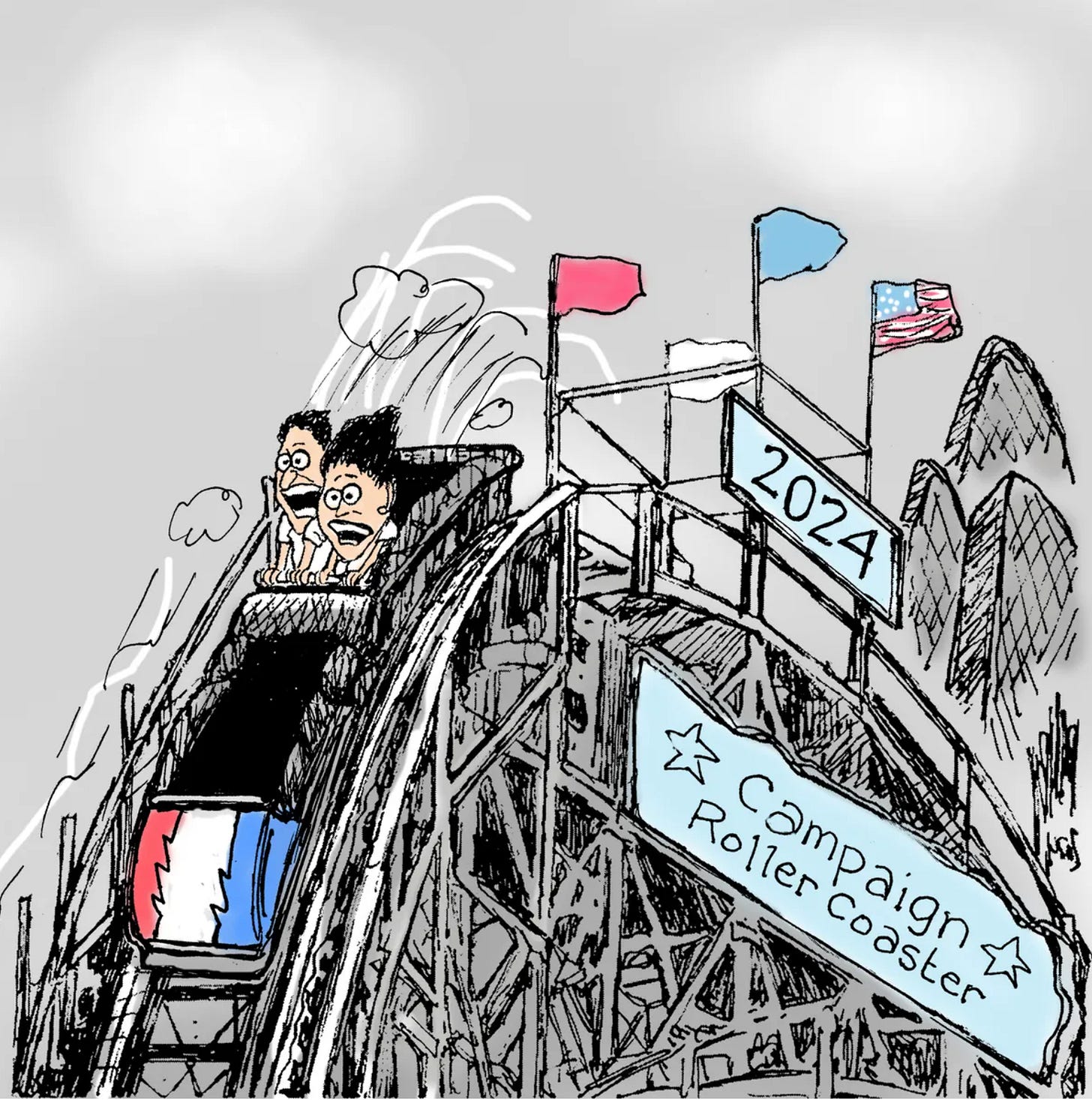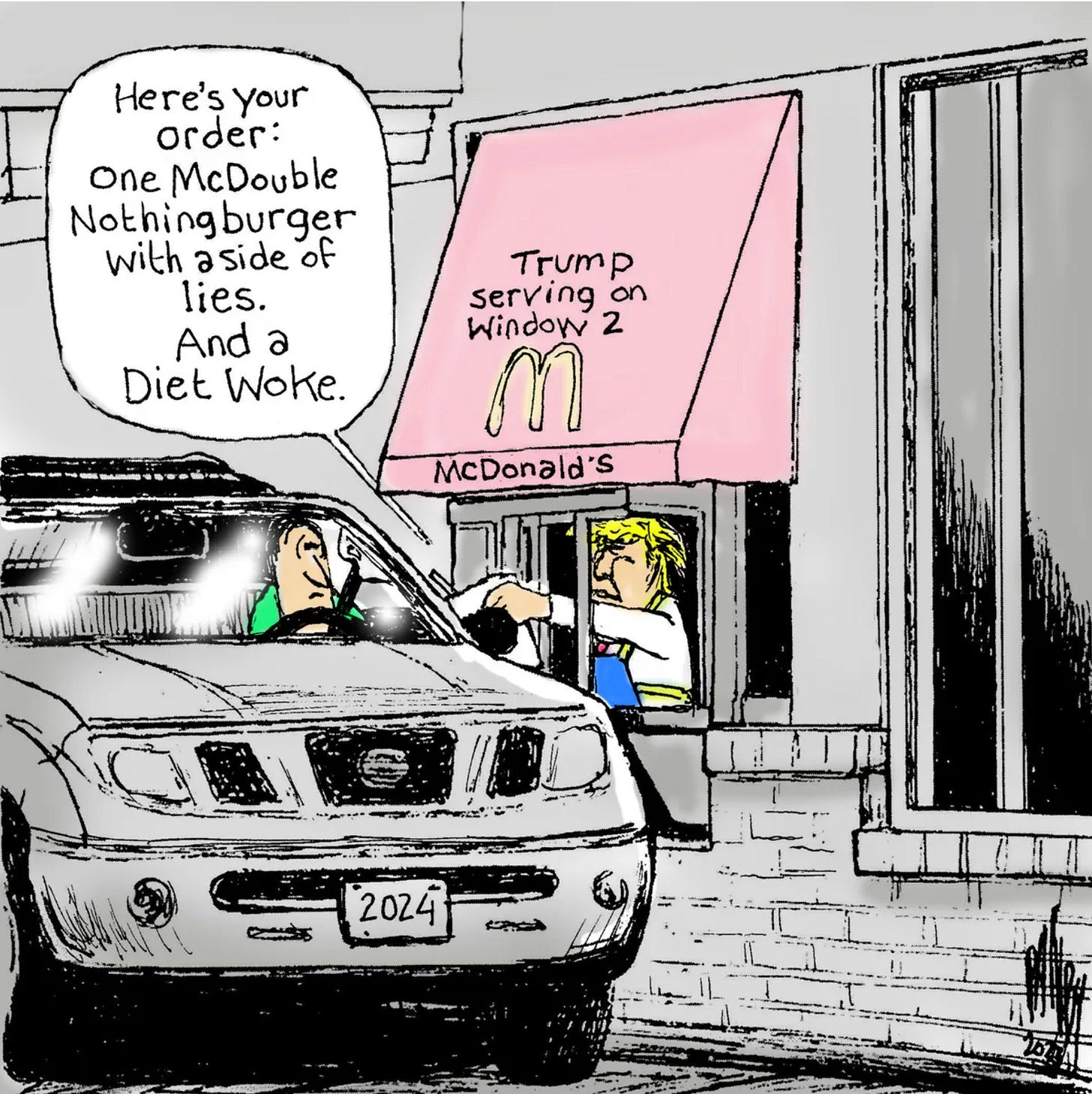The Political Mind Virus
Over It, Social Creatures, Justice Trap, Lighten Up, Procrastination
Images in this week’s 5 Big Ideas come from the über talented George Danby of Bangor Daily News.
I.
Over It
I am sick and tired of election season.
Another day, another mailer. Another door hanger. Another door knocker. Another banner. Another TV advertisement. Another billboard. Another flag. Another political text. Another spammer sent to voicemail. Another op-ed. Another parody. Another celebrity endorsement. Another podcast interview. Another viral clip taken out of context.

I can’t even leave my house without being engulfed in the political spectacle. Over the past month, some of the average-sized yard signs have miraculously grown 4x or 10x. Either that, or they’ve multiplied by 4x or 10x. While in some parts of Reno, the army of signs lined up for one candidate were torn down by enraged partisans and replaced by an army of signs for the other candidate.
And while I could choose to ignore the political rubbish littering my beautiful city, I let my attention be drawn here… there… and, well, everywhere. I want the signs down. I want my city back.
I want my mind back.
II.
Social Creatures
Where love is absent, fear sets in.
Marianne Williamson, A Return to Love
People are social creatures with social needs. We need acceptance, belonging, and love. When we’re lacking in any of these departments, we can become especially susceptible to politics.
Aligning yourself with a political camp creates the expectation of your social needs being met, and that releases a cocktail of happy brain chemicals—oxytocin, serotonin, dopamine, endorphins, oh my! If you haven’t had a good heart-to-heart with another human in a while, a political affiliation can make you feel drunk off newfound feelings of acceptance and belonging. And the more involved in politics you become, the more intoxicated you get, and the more acceptance and belonging you feel. Sounds like a virtuous cycle, right?
Well, there’s a catch. Unlike volunteer organizations, support groups, religious communities, sports leagues, or other high-quality social groups, political parties don’t typically bond over a shared sense of love. Instead, they bond over a shared sense of threat. So while you’re getting hammered off political propaganda cocktails, you’re also releasing some rather sobering brain chemicals—adrenaline, cortisol, norepinephrine, vasopressin, oh no!

The problem with relying on political alliances to fulfill our social needs is that the alliance members are all focused on their own needs. Close social groups aren’t meant to include tens of millions of people. Therefore, it’s easier for a political party to unite around a common external threat than it is to align on a shared internal value. Put simply, what’s lacking is love.
III.
Justice Trap
In Wayne Dyer’s landmark 1976 bestseller, Your Erroneous Zones, he devotes an entire chapter to what he calls “The Justice Trap.” Reading this chapter was the first time I came across a strong argument against getting involved in social justice issues, and it forever changed my perspective on the topic. The key point Dyer makes is that justice does not exist in this world—it never has and never will. While advocating for justice issues may be admirable, choosing to be upset by injustice is as neurotic as approval-seeking, guilt, or any other self-flagellating behavior.
The young and naïve conservationist I once was would often feel paralyzed over climate change. I was outraged by the callous corporations emitting greenhouse gases into the atmosphere, prioritizing profits over future prosperity. I thought Florida would be swallowed into the sea and the whole world would end in a fiery, brutal Anthropocene. Such limiting beliefs created a sense of defeat and purposelessness. I let myself think that what I did didn’t even matter, so, in the name of injustice, I did nothing at all.
These days, getting involved with justice issues often serves as a crafty way of avoiding taking control of our own lives. By making others’ behavior more significant than our own, we dismiss all the shitty things we do and never take responsibility for our actions. As Dyer puts it, “As long as injustice is the cause of your problems, you can never change until the injustice goes away, which, of course, it never will.” While we should aspire to be good and respectable human beings, we shouldn’t require the world to be fair and just to be so. It never has been and never will be.

IV.
Lighten Up
An absence of laughter is an indicator of pathology.
Wayne Dyer, Your Erroneous Zones
Another issue I take with politics is the lack of humor in the whole thing. Why do people feel the need to be so angry and fearful all the time? Somebody is going to be in the White House come January, and if we’ve learned anything at all from the towering mountains of injustices in the world, it’s that we should probably be prepared to accept a President who was not our first pick. So we may as well lighten up.
Humor is not misinformation or disinformation or malinformation or hate speech any other new, spicy label we’re putting on things that people say that we don’t like. It’s satire, comedy, irony, levity. In a New York Times article on the benefits of humor during hard times, contributor Carolyn Todd suggests we make humor a main ingredient in our media diet. We’ve all heard the adage, “laughter is the best medicine,” and a good belly laugh is linked to releasing all those same happy brain chemicals that we get from meeting our social needs. When we can laugh at the ridiculous things someone does or says, we recognize our shared humanity. We find common ground; we find common flaws.
Wayne Dyer suggests, “When you tend to be overly sober about yourself and what you do, remind yourself that this is the only time you have. Why waste your present being angry when laughing feels so good?” So instead of watching Kamala Harris’s “Combative Interview” with Fox News, perhaps you might watch this Saturday Night Live skit of the interview instead. Or maybe you should order up an extra salty Medium fry from President McDonald Trump.

V.
Procrastination
Procrastination is substituting the now with anxiety about a future event. If the event becomes the now, the anxiety, by definition, must go.
Wayne Dyer, Your Erroneous Zones
Politics is the perfect scapegoat for an expert procrastinator. Want to avoid all the challenging and cumbersome activities that give your life meaning? For just an hour each day, you too can ride the Big Politics emotional roller coaster and completely avoid all of your responsibilities. You too can become a pitiful procrastinator like me.
While most politically rapt people are actually just procrastinators in disguise, not all are. Outspoken billionaires Elon Musk and Mark Cuban are not procrastinating when they spend their time, money, and energy campaigning—they’re smart businessmen. Elon wants to maintain control over his $44 billion social media platform and would benefit from scaled-back regulation in industries like space, AI, and autonomous vehicles—all business interests he believes will be best served by a Trump presidency. While Mark owns a prescription drug company that is in discussions with Medicare and would benefit from expanded government social programs—a business interest he believes will be best served by a Harris presidency. Both Musk’s and Cuban’s activism are rooted in smart business interests. But what about you and me? What’s got us so worked up about this candidate or that one? How will they best serve us and our personal interests?
The answer is minimally. At best.
The truth is, for you and I and the vast majority of Americans, the policies and actions of the POTUS will have little effect on our daily lives. What will have a much greater impact—and where we should focus most of our time and attention—is our own actions. What actions can we take today to get one step closer to our goals instead of wasting another hour hooked on politics, social media, celebrities, podcasts, and conspiracy theories? What good does it serve us to have our biases confirmed, yet again, by reading/watching/listening to the same old news channels? Would we be better off writing, working out, making a sales call, dating, spending time with family, or joining a local club? I think so.

At the end of the day, it does matter who’s in charge and we should make informed choices, but we shouldn’t pour all of our time and energy into something that has such a small impact on our lives. Watch a debate or two, read op-eds on both sides, and cast your vote on or before November 5th. But don’t stake your happiness and sanity on a candidate or party that will always put its own interests over yours. Wager your life on your actions, and act. Now.



Amen. When there was only a newspaper for news, I always looked forward to reading the comics section. As you described perfectly it made me feel in touch with my humanity. Levity is what we need, and for us independent voters I never wanted a party affiliation. Good grief, Jen. Thanks for the reminder.
Sounds like you live in a swing state!
It's an interesting point you made about bonding with political parties. For a while, all of my friends came from the political activist groups I was involved in. Eventually as I formed other interests, I realized that all I had in common with a lot of my activist friends was anger. And I didn't want to be angry anymore.
I'm still motivated to enact change but I don't want to complain about everything all the time, I want to do good work and also enjoy my life.